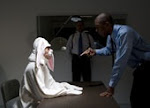Saturday, May 8, 2010
Suicide By Bridge
Investigators spend a lot of time on the road.
Yesterday I covered 180 miles.
We cross many bridges, which pleases me because I have a structural and psychological fascination with bridges. And a morbid fascination with those who willingly jump off them.
One bridge I cross almost daily in the Seattle, the Aurora Bridge, has had many suicides lately. Some have even become political issues.
Go To : One Jumper.
Recently a local man who chooses to walk the Aurora Ave bridge in the hopes of talking someone down decided to do something about jumpers and saving their lives.
He spear-headed an effort to stop people from jumping of the Aurora Bridge by building steel barriers along its edge.
His theory is jumping/suicide is an impulse decision that can be deterred by physical and verbal means.
Last I heard, bridge construction was delayed for technical reasons.
Go to: Aurora Bridge Suicide Barrier Delay
I recently watched a documentary about jumpers from the Golden Gate Bridge.
Go to: Controversial Golden Gate Jump Documentary
This film is disturbing.
You actually see people going over, while the film maker ponders the fates of these lost souls.
I have mixed feeling about this film because intervention was not the filmmaker's intent.
He was non-participant observer who felt his job was to observe and report.
The Golden Gate officials who gave him permission to film the bridge for a year felt they were duped by him.
Go To: Angry Golden Gate Officials
There are all kinds of theories and studies re: bridge jumpers. This short study is of one particular bridge in Instanbul. from Science direct.
Go To: Instanbul Jumpers
So yesterday I think it no coincidence the very moment I was crossing the new span of the Tacoma Narrows bridge... wondering what it must be like to decide to pull over and leap... I flipped my radio on to one of my favorite shows.
Ira Glass' " This American Life" on NPR - National Public Radio.
The following post is a quote from the website that comes from this NPR favorite.
The whole show was about bridges and this paragraph is one one three acts in the program.
"There is a four mile long bridge in Naan-jing China, famous for how many people jump off to commit suicide. In 2003, a man named Chen Sah began spending all of his weekends on the bridge, trying to single handedly stop the jumpers. Reporter Mike Paterniti tells his story of meeting Mr. Chen."
I went to find Paterniti's article and try as I might, couldn't find it on line. I'm guessing they want us to buy the magazine,
Though I listened in rapt attention to Glass' discussion with Paterniti about his encounter with the odd and cantankerous Mr Chen and the bridge in China you probably never thought about until now. Mr Chen is an average citizen who does nothing all day except patrol the bridge on his scooter, somehow ID jumpers and talk them down.
Mr Chen's approach to talking people down is unbelievable. You'll need to go to go to National Public Radio to hear the story, provided it's up now. It's episode 407
Or try to find the article Mike Paterniti wrote in GQ Magazine.
According to one event Paterniti witnessed, Mr Chen took the potential jumper's picture, said he was going to to punch him in the face, then switched to nice guy who listened to jumper's sad story, told the jumper why it is not right for a Chinese man to jump and made an appointment with him the next day.
This approach points out clearly... and shockingly... the differences in cultural approaches to negotiating critical sitiuations.
What follows is a link to Mr Chen's actual blog, about his experiences in his own words, direct from China via NPR and translated. As stated on the site I take you to...
"These are some posts from Mr. Chen Si's blog The Bridge Diaries, where he documents his experience trying to stop people from jumping off the Yangtze River Bridge in Nanjing, China."
Go To: Mr. Chen's Jumper Blog
There is an old saying, " leap and the net will appear"
In the case of suicide by bridge, the net is not likely to appear.
Yesterday I covered 180 miles.
We cross many bridges, which pleases me because I have a structural and psychological fascination with bridges. And a morbid fascination with those who willingly jump off them.
One bridge I cross almost daily in the Seattle, the Aurora Bridge, has had many suicides lately. Some have even become political issues.
Go To : One Jumper.
Recently a local man who chooses to walk the Aurora Ave bridge in the hopes of talking someone down decided to do something about jumpers and saving their lives.
He spear-headed an effort to stop people from jumping of the Aurora Bridge by building steel barriers along its edge.
His theory is jumping/suicide is an impulse decision that can be deterred by physical and verbal means.
Last I heard, bridge construction was delayed for technical reasons.
Go to: Aurora Bridge Suicide Barrier Delay
I recently watched a documentary about jumpers from the Golden Gate Bridge.
Go to: Controversial Golden Gate Jump Documentary
This film is disturbing.
You actually see people going over, while the film maker ponders the fates of these lost souls.
I have mixed feeling about this film because intervention was not the filmmaker's intent.
He was non-participant observer who felt his job was to observe and report.
The Golden Gate officials who gave him permission to film the bridge for a year felt they were duped by him.
Go To: Angry Golden Gate Officials
There are all kinds of theories and studies re: bridge jumpers. This short study is of one particular bridge in Instanbul. from Science direct.
Go To: Instanbul Jumpers
So yesterday I think it no coincidence the very moment I was crossing the new span of the Tacoma Narrows bridge... wondering what it must be like to decide to pull over and leap... I flipped my radio on to one of my favorite shows.
Ira Glass' " This American Life" on NPR - National Public Radio.
The following post is a quote from the website that comes from this NPR favorite.
The whole show was about bridges and this paragraph is one one three acts in the program.
"There is a four mile long bridge in Naan-jing China, famous for how many people jump off to commit suicide. In 2003, a man named Chen Sah began spending all of his weekends on the bridge, trying to single handedly stop the jumpers. Reporter Mike Paterniti tells his story of meeting Mr. Chen."
I went to find Paterniti's article and try as I might, couldn't find it on line. I'm guessing they want us to buy the magazine,
Though I listened in rapt attention to Glass' discussion with Paterniti about his encounter with the odd and cantankerous Mr Chen and the bridge in China you probably never thought about until now. Mr Chen is an average citizen who does nothing all day except patrol the bridge on his scooter, somehow ID jumpers and talk them down.
Mr Chen's approach to talking people down is unbelievable. You'll need to go to go to National Public Radio to hear the story, provided it's up now. It's episode 407
Or try to find the article Mike Paterniti wrote in GQ Magazine.
According to one event Paterniti witnessed, Mr Chen took the potential jumper's picture, said he was going to to punch him in the face, then switched to nice guy who listened to jumper's sad story, told the jumper why it is not right for a Chinese man to jump and made an appointment with him the next day.
This approach points out clearly... and shockingly... the differences in cultural approaches to negotiating critical sitiuations.
What follows is a link to Mr Chen's actual blog, about his experiences in his own words, direct from China via NPR and translated. As stated on the site I take you to...
"These are some posts from Mr. Chen Si's blog The Bridge Diaries, where he documents his experience trying to stop people from jumping off the Yangtze River Bridge in Nanjing, China."
Go To: Mr. Chen's Jumper Blog
There is an old saying, " leap and the net will appear"
In the case of suicide by bridge, the net is not likely to appear.
Subscribe to:
Post Comments (Atom)








Chinese people are immensely proud of their country, and anyone who makes it look bad is fair game to be "Straightened Out" by one or many citizens.
ReplyDeleteEven to marital sitations, where it is not uncommon for a man to beat his wife in public for immoral behaviour, even though it seems to be acceptable fore the male to go beyond the acceptale behaviour of society.
A very strange culture, but also very intersting and beautiful in many ways.
article.
ReplyDeletehttp://www.gq.com/news-politics/big-issues/201005/suicide-catchers-nanjing-bridge-yangtze-river-mr-chen?currentPage=1